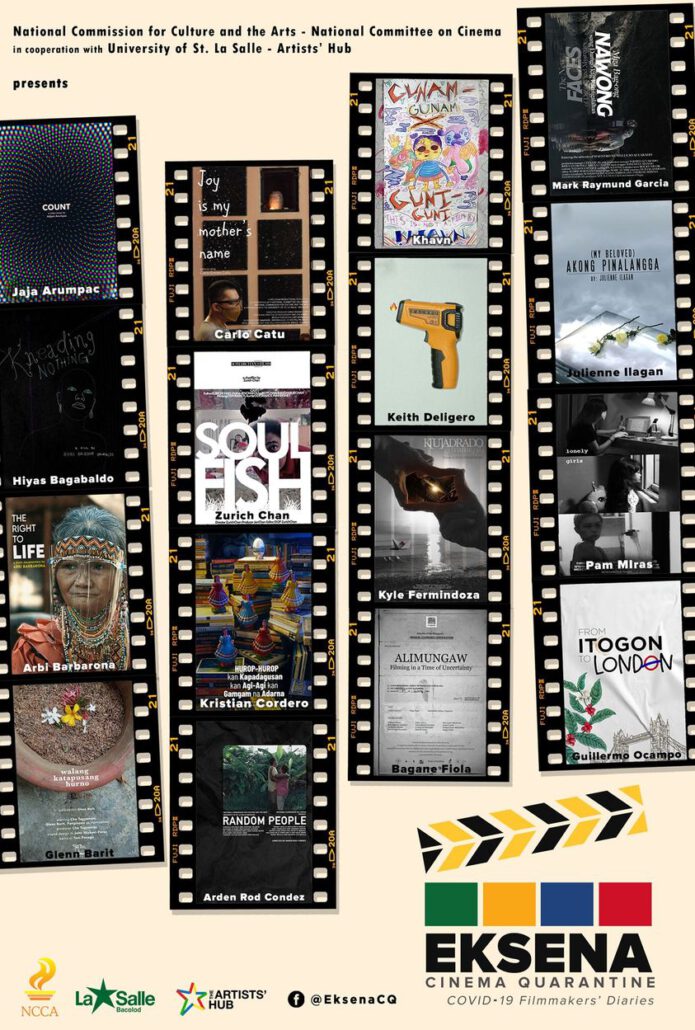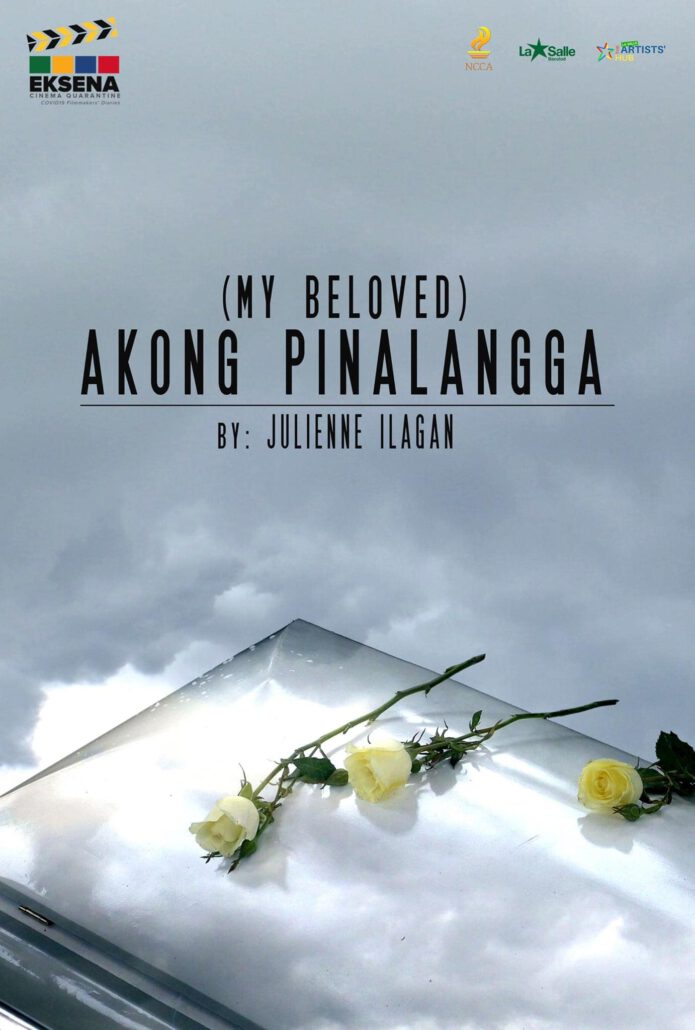Eksena Cinema Quarantine: COVID19 Filmmakers’ Diaries get candid on death, despair, coffee and chaos
By L.S. Mendizabal
Around this time in 2020, a specter was haunting the world—the specter of a new coronavirus that soon became a full-blown pandemic whose global impact has been like no other in human history. The militaristic enhanced community quarantine nationwide, the first of many, enforced impossible health and safety protocols that paralyzed hundreds of thousands of Filipinos and were used to suppress widespread dissent against the government. The same protocols have been bent and twisted to favor the few rich and powerful. It was only a matter of time before artists and cultural workers, especially the independent ones, felt the blunt force of state abandonment and terrorism as its knee-jerk response to an enemy that cannot be seen.
The National Committee on Cinema of the National Commission for Culture and the Arts (NCCA-NCC), in cooperation with University of St. La Salle-Artists’ Hub, gathers 16 of the most promising filmmakers across Luzon, Visayas and Mindanao in Eksena Cinema Quarantine: COVID19 Filmmakers’ Diaries. Welded together in two omnibus films, Eksena 1 and Eksena 2, are their short films that touch upon their own experiences during lockdown, isolated and barely surviving.

“As a filmmaker in this pandemic, it’s so hard to earn an income,” says a little upside down smiley drawn above a human mouth in Glenn Barit’s Walang Katapusang Hurno. A pretty strong opening for Eksena Part 1, it is straightforward, honest about the artist’s guilt that intellectual/ cultural labor (in this case, filmmaking) is next to nothing in the midst of a global health crisis and social and economic degradation, that receiving film grants justifiably feels wrong when such funds could instead go to social aid. “But we are also struggling yet still very privileged,” the smiley says while chatting with another upside down smiley as they go on about getting an oven for baking to make ends meet. Barit’s laidback storytelling style, social commentary (with a bonus Dolomite Song by Toni Panagu towards the end) and humor, both silly and dark, has enough charm and hostility to prime the viewer for the next three hours of shorts on essentially what it’s like to be quarantined in post-Duterte Philippines—a not so inviting yet gripping rollercoaster ride of emotions and introspection.
The man in Kyle Fermindoza’s K[u]adrado (Frame/d) finds himself in somewhat the same dilemma as Barit. Seemingly his take on the old proverb of “teaching a man how to fish to feed him for a lifetime,” Fermindoza’s stunning visuals revolve around striking the balance between the struggle to survive and the need to create art as tools for human enlightenment and liberation.

The Filipino middle class experience is documented well in the entire anthology, and understandably so. Zurich Chan (Soul Fish) and Julienne Ilagan (Akong Pinalangga (My Beloved)) position themselves in front of the camera as they let us peek into their lives with their families whilst in isolation. The internet is the only medium through which they experience separation from and connection with their loved ones. One family goes to a birthday online, the other a funeral. There is helplessness and yearning in both.

But perhaps the most personal, sensitive and vulnerable that made me cry my eyes out at 3 AM is Carlo Catu’s Joy is My Mother. Death in the family is something that nobody could ever prevent, but for it to happen in these times makes it harder tenfold. Catu and his loved ones recount how they’ve been trying to move forward after Catu’s mom died from cancer. They welcome the audience into their home in the province and show us photos and videos of their source of Joy. The mini-doc is simple, intimate, cozy despite being tragic. I imagine how making this could’ve been cathartic for Catu as much as it may console those who might have lost people in their lives too over lockdown, particularly when most have been deprived of collective mourning since traditional wakes are not allowed.
We see the same theme of love (and loss) in the time of Corona in Random People where Arden Rod Condez closes in on couples of different generations and genders in Antique as they bathe, embrace each other, share a sensual kiss or an inaudible yet very animated conversation. The borderline voyeuristic images will either make you feel uncomfortable or comforted or both. The last shot of an old man kissing the grave of his loved one makes it one of the more powerful pieces on human emotion in the ECQ anthology. This is especially refreshing when both reality and social media have desensitized us to the steadily increasing number of deaths, to so much hate and inhumanity.
Bagane Fiola (Alimungaw: Filming in a Time of Uncertainty) and Guillermo Ocampo (From Itogon to London) take us to their places of work that have suffered greatly from the economic repercussions of the pandemic. Fiola shows us how filmmaking is now fundamentally done in strict compliance with COVID protocol. Alimungaw is an objective study of the creative and logistic challenges that all artists must face at present if they decide to create at all. On the other end of the spectrum, Ocampo, a young entrepreneur, attempts to be lighthearted, even funny, romantic and then sympathetic towards the miners-turned-coffee farmers who used to supply his newly opened café bistro which was abruptly closed at the onset of the national ECQ. I must admit that I find the cinematography, tone and style of this one a bit jarring as it straddles between being a lifestyle/tourism feature and a product commercial not unlike Nescafe’s longer ads that romanticize the exploitation of its farmers. Artists and their works have been diminished into commodities in the boundless marketplace of ideas—sure, nothing new about that!—but there’s still something a little unsettling about a narrative that says it finds “inspiration” or the slightest glimmer of hope in the exportation of a local product, specifically Itogon coffee, to London where it has become popular. Meanwhile, the peasant in Benguet remains shackled to landlessness and a life of poverty in the upland, waiting for government aid and the occasional “jackpot” on harvest season at the mercy of the buyer.
Giving us a glimpse of the Lumad community that was forced to flee their homeland due to intensified militarization and state-sponsored killings and abuse of their people, Arbi Barbarona visits their evacuation center in The Right to Life. Despite being far away from home where their herbal medicines and place of worship are within reach, the Lumad are able to establish a system of basic healthcare. Colonized even further by face masks, face shields and hand sanitizer, the leaders continue to assert their right to their lands and their lives.
Pam Miras and Keith Deligerobring unexpected elements of horror and science fiction to the anthology. Lonely Girls interprets the terrifying circumstances that little girls and women, already isolated by a patriarchal macho-feudal society, likely experience in isolation and how they are often robbed of control over their own bodies.

Kalayo, on the other hand, examines a city from a seemingly omniscient perspective, courtesy of aerial and close surveillance shots. “Poetry by Duterte” delivered by a text-to-speech voice reader (a nice little touch of defamiliarization!) plays in the background, which is basically just some of his false claims about COVID19. The city is sometimes empty and peaceful, or noisy with ambulances and police cars, or in flames. The running man in orange, Deligero himself, is a prisoner of his vast suburban cell.

Mark Garcia’s Mga Bag-ong Nawong sang Damgo kag Katingalahan is a visual treat. Abstract in its poetry on death and the zombie-like state of present-day living, the narrator seems to lead some type of an incantation with another one repeating his words, praying that we all get to breathe freely again.
Meanwhile, Hurop-hurop kan Kapadagusan kan Agi-agi kan Gamgam na Adarna by Kristian Sendon Cordero begins with the mysterious arrival of an egg and an Ibong Adarna booklet in Bikolano at his bookshop. This sparks a long discussion among women (ceramic dolls) in the store on how the legend should’ve gone and how the people have a right to the magical bird, not just kings.
Hiyas Baldemor Bagabaldo’s Kneading Nothing probes more into the artist’s self. It goes heavy on the animation as the viewer is taken to the mind of the narrator who obsesses over astronomy and astrology as some sort of coping mechanism during isolation. In the end, uncertainty and anxiety eat her up as she presses repeatedly the snooze button on the phone alarm she has religiously set by the hour. By trying to escape, she gets stuck within the confines of her individualism.

Another short that utilizes animation—the stop-motion chess scene is a personal favorite of mine—is Khavn dela Cruz’s Gunam-Gunam x Guni-Guni whose titular characters are played by his two children, Katch23 and 1delacruz. Wearing masks and face shields, they let loose and run amok outdoors, which I suppose may be likened to one’s chaotic rumination and phantasm when they’re isolated for far too long. A woman’s voice narrates what sound like snippets from deconstructed lessons on the Filipino language until they become mere gibberish, calling to mind the difficulties of online education and its negative effects on the students’ psyche and physical wellbeing.
In a similar vein, Adjani Arumpac features her children enrolled in distance learning as she navigates her way through domestic and professional life in Count. The little boy, Lio, finds adventures in every nook and cranny of their house, convinced that a monster of “wrong numbers” and supervillains (the police) lurk outside their gate. Arumpac’s contemplation of the COVID crisis, human rights violations in the country, etc., images of Reina Mae Nasino in front of her infant daughter’s casket and of a cat eager to protect her newborn litter as well as news of the illegal arrest of Amanda Echanis and her one-month-old child illustrate motherhood in the harshest conditions, at its most helpless but at also at its most resilient. Like the seeds from the dead flower that are planted anew, our children are the reason we keep hoping, creating and moving forward, making Count a most fitting closing film in the ECQ anthology.
Watching all 16 films and trying to relate to each and every one of their stories feels like reliving all ten months of the lockdown—exhausting as if stuck in an oven, baking for a protracted amount of time until you are numb to the fire, until people are reduced to numbers of deaths and recoveries, likes and dislikes, until life shrinks into your phone or your computer. We are not dealing with just the virus but with an even bigger threat to our lives and civil liberties. It must be noted that the country has been on the longest COVID lockdown in the world since March last year and yet we have never been more at risk. Extrajudicial killings, illegal arrests and red-tagging of activists are still rampant. Not speaking against the government does not exempt anyone from state violence. These days, nobody is safe. Macho-fascism accompanied with psychological warfare exists in our own homes, on the news, in that new GMA teleserye on the romantic entanglement between a much older president of the Philippines and his younger “first yaya,” our Facebook feeds, even on Tiktok! Our culture is being held hostage by the State.
This is where the indispensible role of the artist and filmmaker comes in. There is an ongoing race towards winning the hearts and minds of the masses.
ECQ: COVID19 Filmmakers’ Diaries Eksena Parts 1 and 2 premiered on January 22, last Friday, and will be available for free streaming until January 28 at 11:59 PM on Vimeo. A four-part webinar series in which the 16 filmmakers share their creative processes behind their pieces will also take place on their Facebook page from January 25 to 28 at 6 PM. You may visit facebook.com/EksenaCQ for more details. #

